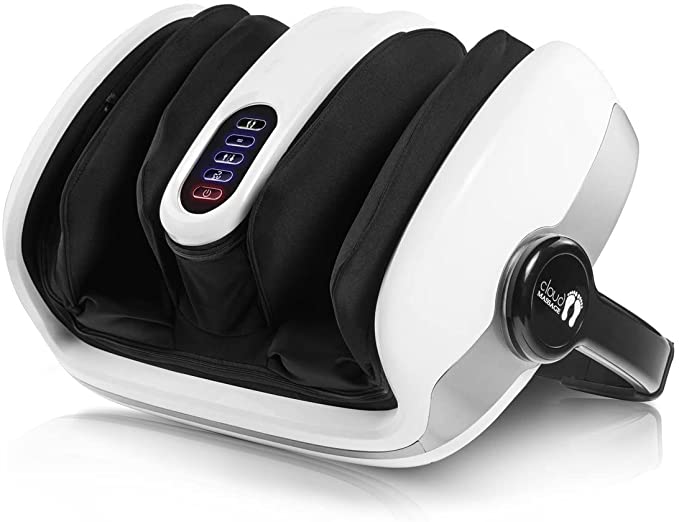If you suffer from swollen feet and ankles, know that you are not alone. This can be caused, in part, by excessive sitting throughout the day — people who work in offices or sit at a desk for a majority of the day especially fall into this category but is there any way how to prevent feet swelling while sitting at a desk?
Of course, swelling can be very painful and uncomfortable. To that end, know that prevention is much easier than remedying the issue after it’s already affecting you.
The first step in preventing such pain throughout your body is understanding how this happens and how you can prevent it from happening through diet, exercise and proper ergonomics.
A Heavenly Foot Massage At Your Desk
The Cloud Massage Shiatsu Foot Massager provides a deep foot, ankle, and leg massage using a deep-kneading Shiatsu technique. This wonderful device helps improve blood flow, reduce inflammation, stimulate muscle recovery, and provide pain relief. Enjoy pure and thorough relaxation right at your desk.
Why Do Feet Swell From Sitting?
When gravity draws the fluids in your body down, it causes fluid retention due to poor circulation. This can be caused by or lead to infection or inflammation and possibly more serious health problems.
Sitting at your desk for long periods contributes to fluid retention but is often not the only cause; an unhealthy diet and lack of exercise can be contributing factors here, too.
What Not to Do About Swollen Feet
Some common mistakes contribute to swollen feet and should be avoided. The best thing to do is prevent this from happening before it even starts. If it starts, the best thing is to address it as soon as possible.
Do Not Ignore It
We strongly recommend against ignoring your discomfort and swelling. It will only worsen as time goes on, especially if you don’t change any of your habits. It may seem like swollen feet are normal, but they can be indicative of something more serious.
Do Not Sit in These Positions
Crossed Legs
While crossing your legs can feel natural and comfortable, it’s not a good idea in the long run. When you cross your legs, you put a great deal of stress and pressure on one foot while the other is relaxed and hanging.
In this case, the grounded foot will take the brunt of your weight, as well as the fluid flowing downward. This foot will suffer from stress, tension and even possible bruising.
Meanwhile, the hanging foot experiences partial weakened circulation and can lead to more swelling.
Sitting on Feet
Many people sit on their feet to prop themselves up, relieving tension on their back or legs. While this can feel like it’s helping, it causes all of your body weight to press down on your foot and distort it into unnatural conditions.
If you do this often, we recommend breaking this habit — it will relieve a great deal of foot, ankle, knee, and leg discomfort.
Crossed and Outstretched Legs

While this position can look laid back and comfortable, it puts stress on your ankles and the heels of your feet. The worst part about it is the stress and poor curvature it places on your spine.
Even positions that feel comfortable and natural can be damaging your body, which is why understanding the ergonomics of sitting is so valuable to your health.
What to Do About Swollen Feet
Preventing swelling is the easiest way to deal with this problem. The earlier you take these steps to improve your health and lessen the chances of experiencing it, the more likely you will avoid discomfort and serious health problems.
Exercises

These are some easy exercises you can even do at work to prevent or alleviate the swelling.
Leg Extensions
While sitting, lift your leg one at a time and hold it straight out for a few seconds. Repeat this 20-30 times on each leg.
Foot Pumps
Rock your feet back and forth, so you put pressure on your toes and then on your heels. Continue to do this slowly for a few minutes, really stretching the soles of your feet.
Preventative products
Compression socks and stockings can help prevent fluid retention and swelling. Using these should be combined with other healthy practices to prevent fluid retention. For those looking to relieve discomfort quickly and stop it from worsening, compression products can be very helpful.
Healthy Eating
Keeping a proper diet at home helps reduce the likelihood of swelling. Daily portions of vegetables and lots of water throughout the day, especially when sitting a lot, help your body circulate blood more efficiently.
This all comes down to how your blood is circulating. So anything that will contribute to your heart health will alleviate some of this discomfort and swelling.
Possible Health Consequences
There are a few health conditions to be aware of if you struggle with swollen feet and ankles. Swollen feet are sometimes a symptom of something worse or can lead to a more serious condition, so be sure to check with your doctor if you feel your pain is prolonged or getting worse.
Swelling in the feet and lower limbs could mean there are other issues with your heart, kidney, or lymphatic system. This is not always the case, but it is important not to ignore the signs your body may be trying to send you.
Bottom Line
If you believe your feet or ankles are swelling after sitting down all day, take these measures to make your life more comfortable and stop experiencing unnecessary pain. The most important thing you can do to prevent or alleviate this issue is to move around consistently throughout the workday and don’t let yourself be chained to your desk.
Our bodies were not built to stay in one position every day, all day so moving around and keeping your blood flowing should always be at the forefront of your mind.
Frequently Asked Questions
Does this happen to everyone?
People who exercise regularly and eat healthily are less likely to experience this. That isn’t to say it isn’t common, because many people that work at desks suffer from swelling.
When should I see a doctor?
If your pain is unbearable or chronic, you should consider meeting with your doctor to find out if there are underlying issues. Swollen feet can be indicative of a variety of conditions that must be diagnosed by a professional.
